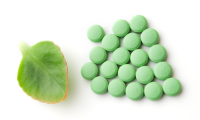Antimicrobials
 Definition
Definition
An antimicrobial is a substance which contains agents that inhibit the growth of and/or destroy microscopic pathogens. In other words antimicrobials are “natural antibiotics”.
These herbs and supplements not only reduce the ability of the microbes to reproduce but also can promote the body’s ability to increase its own immunity.
- Antifungals specifically act on fungi (substances that inhibit the growth of and/or destroy fungi)
- Antibacterials specifically act on bacteria (substances that inhibit the growth of bacteria (bacteriostatic) and/or destroy bacteria (bactericidal))
- Antivirals specifically act on viruses (substances that inhibit the growth of and/or destroy viruses)
Conventional Antimicrobials
Antibiotics first hit the scene in 1928 when Sir Alexander Fleming figured out that mold had antibacterial powers. Ever since then, prescription antibiotics have become superpowers in their own right, healing and certainly saving the lives of millions of people.
However, all prescription antibiotics lose their effectiveness over time, because bacteria learn to live with these chemicals. The more antibiotics we use, therefore, the quicker the bacteria adjust. Adjusting in this case means that the bacteria learn to thrive despite the presence of the antibiotic. The result is that the antibiotics become ineffective and the bacterial world is thrown out of balance. Many bacteria produce the same antibiotics that we use as medicines as a way of protecting themselves from other bacteria. This protective mechanism stops working when too many bacteria become resistant. Thus one of the main requirements for an antibacterial or antimicrobial therapy is the bacteria’s sensitivity to a given antibiotic drug.
Natural Alternatives
Today, herbal antimicrobials are attracting more attention and emerging as scientifically proven and accepted remedies for fighting various bacteria, fungi, and viruses. Many health care practitioners turn to natural alternatives due to the downside of conventional options.
Safety
The proper use of herbs and supplements should pose no health risk. There are herbs that are toxic and should not be used by the public. It is particularly important to pay attention to dosage requirements and therapeutic effects of a product. If you are unfamiliar with a herb or a supplement and can not find any valid literature, then do not use it or consult with a health practitioner.
As with any substance, whether it is a food or a drug, allergic reactions can occur with herbs. When using a product for the first time it is recommended to take a small amount – such as 3 drops or a dab of the powder form, to see whether an adverse reaction happens in the next two hours. If a severe allergic reaction does occur, such as wheezing, difficult breathing, or hives, seek medical attention immediately and discontinue any further use of the product. If more mild reactions occur, such as itching or a mild rash, try to choose another herb that has a similar therapeutic action.
References
- Balch, J.F. & Stengler, M. Prescription for Natural Cures: a self-care guide for treating diseases and health problems with natural remedies including diet and nutrition, herbal medicine, nutritional supplements, bodywork, and more. John Wiley & Sons, Inc (2004)
- Hammer, K.A., Carson, C.F., &Riley, T.V. 1999. Antimicrobal activity of essential oils and other plant extracts. Journal of Applied Micrrobiology 86:985-90
Posted in Antimicrobials
Ask a Question Or Join a Discussion


